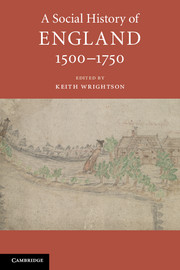Book contents
- Frontmatter
- Contents
- List of Figures
- List of Tables
- List of Contributors
- Acknowledgements
- List of Abbreviations
- Introduction: Framing Early Modern England
- PART I DISCOVERING THE ENGLISH
- PART II CURRENTS OF CHANGE
- PART III SOCIAL IDENTITIES
- 12 ‘Gentlemen’: Remaking the English Ruling Class
- 13 The ‘Middling Sort’: An Emergent Cultural Identity
- 14 The ‘Meaner Sort’: Labouring People and the Poor
- 15 Gender, the Body and Sexuality
- 16 The English and ‘Others’ in England and Beyond
- Coda: History, Time and Social Memory
- Further Reading
- Index
12 - ‘Gentlemen’: Remaking the English Ruling Class
from PART III - SOCIAL IDENTITIES
Published online by Cambridge University Press: 28 May 2018
- Frontmatter
- Contents
- List of Figures
- List of Tables
- List of Contributors
- Acknowledgements
- List of Abbreviations
- Introduction: Framing Early Modern England
- PART I DISCOVERING THE ENGLISH
- PART II CURRENTS OF CHANGE
- PART III SOCIAL IDENTITIES
- 12 ‘Gentlemen’: Remaking the English Ruling Class
- 13 The ‘Middling Sort’: An Emergent Cultural Identity
- 14 The ‘Meaner Sort’: Labouring People and the Poor
- 15 Gender, the Body and Sexuality
- 16 The English and ‘Others’ in England and Beyond
- Coda: History, Time and Social Memory
- Further Reading
- Index
Summary
‘Gentlemen’ have been a problematic group in English social history, not least because they often elude easy definition in terms of their membership or common attributes. These problems are compounded by contemporaries’ willingness to use the term ‘gentleman’ in two, overlapping but distinct, ways: as an inclusive category, applied to all those of gentle birth and status (including the titular aristocracy); and as a term reserved specifically for ‘lesser nobles’, below the rank of ‘baron’ (baronets, knights, esquires and ‘mere’ gentlemen). This chapter will focus on the latter group, because non-titular landed gentlemen (the group referred to from the mid eighteenth century as ‘the gentry’) formed the core of the English landed elite from the sixteenth to the nineteenth centuries. Although the titled aristocracy expanded from 60 families in 1600 to over 600 by 1800, and accumulated a disproportionate share of wealth, status and power in Britain and Ireland, they shared many of their essential social and cultural characteristics with the wider swathe of landed society that will be considered here.
Social historians’ problems with landed society reflect deeper ambivalences created by the inception and evolution of social history itself over the last century. This has produced a situation in which we know a huge amount about lives, experiences, opinions, actions and dynamics within this group, but where much of its social history still remains to be written. This chapter will consider three dimensions of this unfinished social history. Firstly, it will reflect upon the reasons why the group has proved problematic to social historians. Secondly, it will review the main conclusions that can be abstracted from the voluminous literature on the lives and activities of the gentry through the early modern period. Thirdly, it will suggest ways in which future studies might pursue the social history of this group, and, in particular, to integrate it further into the mainstream of analyses of early modern society.
For a century a simple, axiomatic question has bedevilled historical understandings of the English gentry – should social history concern itself with a group of 10,000–20,000 families who constituted the ruling elite through the early modern period? Any possible answer bears directly upon the composition of the ‘society’ that social history professes to study, and on the nature of the ‘history’ that it seeks to write. There are three reasons why English social history has been very ambivalent about the gentry.
- Type
- Chapter
- Information
- A Social History of England, 1500–1750 , pp. 269 - 289Publisher: Cambridge University PressPrint publication year: 2017
- 2
- Cited by

